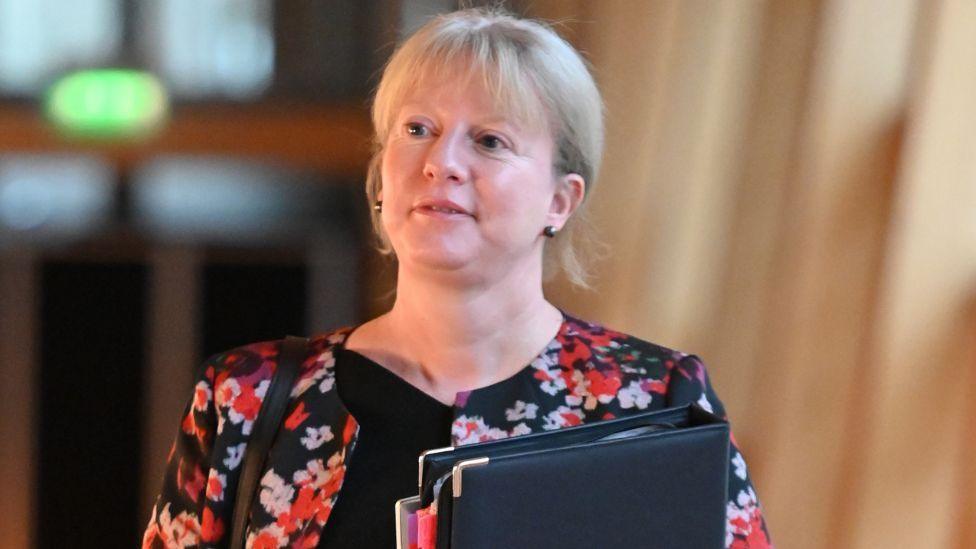Ministers lack plan for £5bn black hole, auditor says

Finance Secretary Shona Robison says the government has spent its funds "where it is needed most"
- Published
The Scottish government has been warned that it lacks a detailed plan to fill a £5bn shortfall by the end of the decade.
Scotland's auditor general Stephen Boyle also confirmed that ministers recorded a £1bn underspend for the last financial year.
He said that the yearly underspend - which is not unusual at Holyrood - was due to a £2.2bn increase in UK government funding and one-off savings.
The Scottish government said the figures showed it had a "firm grip" on public finances.
Mr Boyle noted that the government's medium-term forecast is for a £4.7bn funding gap by 2029-30.
About £2bn of that is expected to come from a rising social security bill, with the auditor general also citing rising workforce costs.
The report said ministers were yet to explain how they would make up for the projected budget black hole.
Call for 'detailed' plans
Mr Boyle said: "Although the Scottish government reported a £1bn underspend this year, it did so from a combination of additional funding from the UK government and one-off savings.
"A forecast gap of nearly £5bn remains between what ministers want to spend on public services and the funding available to them.
"The Scottish government needs to prepare more detailed plans setting out how it will close that gap by the end of the decade."
The auditor general also warned that "significant pressures" remained as the government aims to balance its budget in the current financial year.
He said many of the cuts made so far were one-off savings and that the government's "short-term approach" to managing its spending does not support the "fiscal sustainability of the Scottish public sector".
The government's total expenditure in 2024-25 was £56.3bn, £1bn less than the total budget.
That is not a major departure from recent years. The government underspent its budget by £277m in 2023-24, external and by £509m in 2022-23, external.
The year before that, ministers recorded an underspend of £2bn.
The difficulties of navigating Scotland's economic black hole
- Published26 August
No plan to plug £770m disability benefits gap - watchdog
- Published18 September
The auditor general's report for 2024-25 found that ministers spent almost £60m on a new IT system to manage HR, finance, and procurement functions for the government, local authorities and public bodies.
Mr Boyle said the government would need to demonstrate "value for money" on the investment.
He also criticised spending £85,000 on hiring a former staff member for four months through an agency, while two further direct awards of work to the agency resulted in a £220,689 bill.
The worker had a "technical" role related to the closure of the European Structural and Investment Funds.
The auditor general said that level of spend was not "appropriate without a more robust approval and monitoring process being in place".
He said a recommendation for the government to review its procedure for hiring staff through agencies had been accepted.
Emergency spending measure
The Scottish government had to introduce emergency spending curbs last year to balance its budget, as well as £500m of cuts.
At the time, Finance Secretary Shona Robison cited higher than expected public sector pay deals, Westminster austerity, inflation, the pandemic and the war in Ukraine.
Robison also said ministers would draw down up to £460m from the leasing auction of seabed plots for major offshore wind projects - which raised more than £700m in 2022. The money had been previously pledged, external to "help tackle the twin climate and biodiversity crises".
Mr Boyle said that the extra UK government funding, announced in the chancellor's Autumn Budget in October last year, meant Scottish ministers did not have to dip into the £460m renewables offshore wind pot.
Finance Secretary Shona Robison said: "These unqualified accounts show that the Scottish government has once again demonstrated the firm grip we have on the public finances - despite the continued impact of inflation, pressure on public sector pay and wider geopolitical instability."
She added: "The Scottish government cannot overspend on its budget and - as we do every year - we left a small underspend in 2024/25.
"There is no loss of spending power to the Scottish government and our effective and prudent financial management means every penny has been reallocated for the current financial year so it is spent where it is needed most."